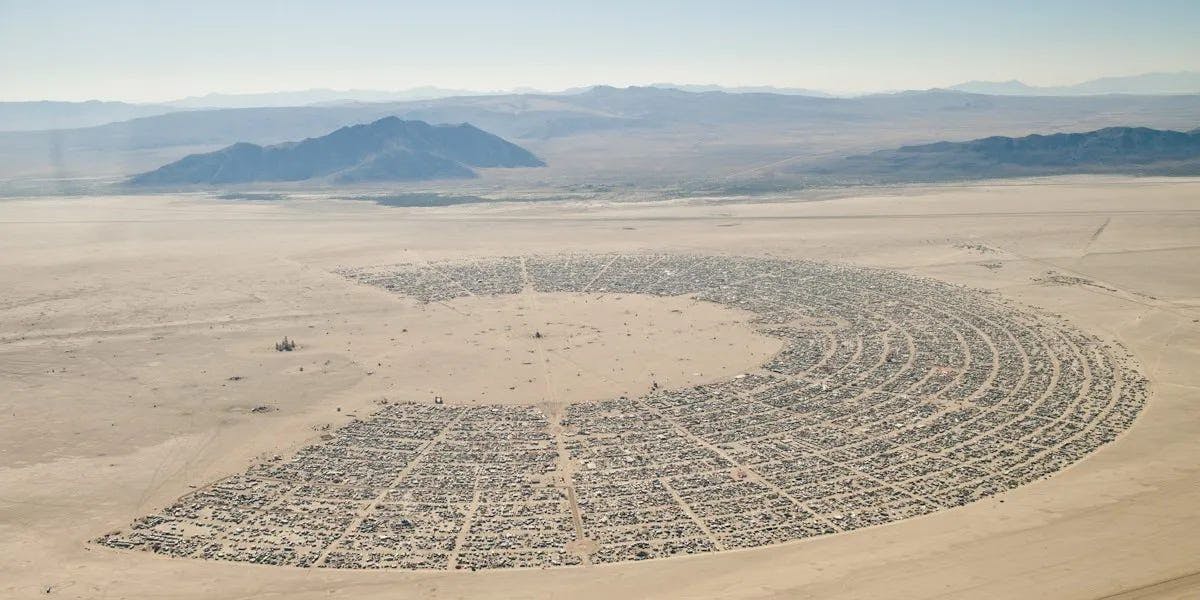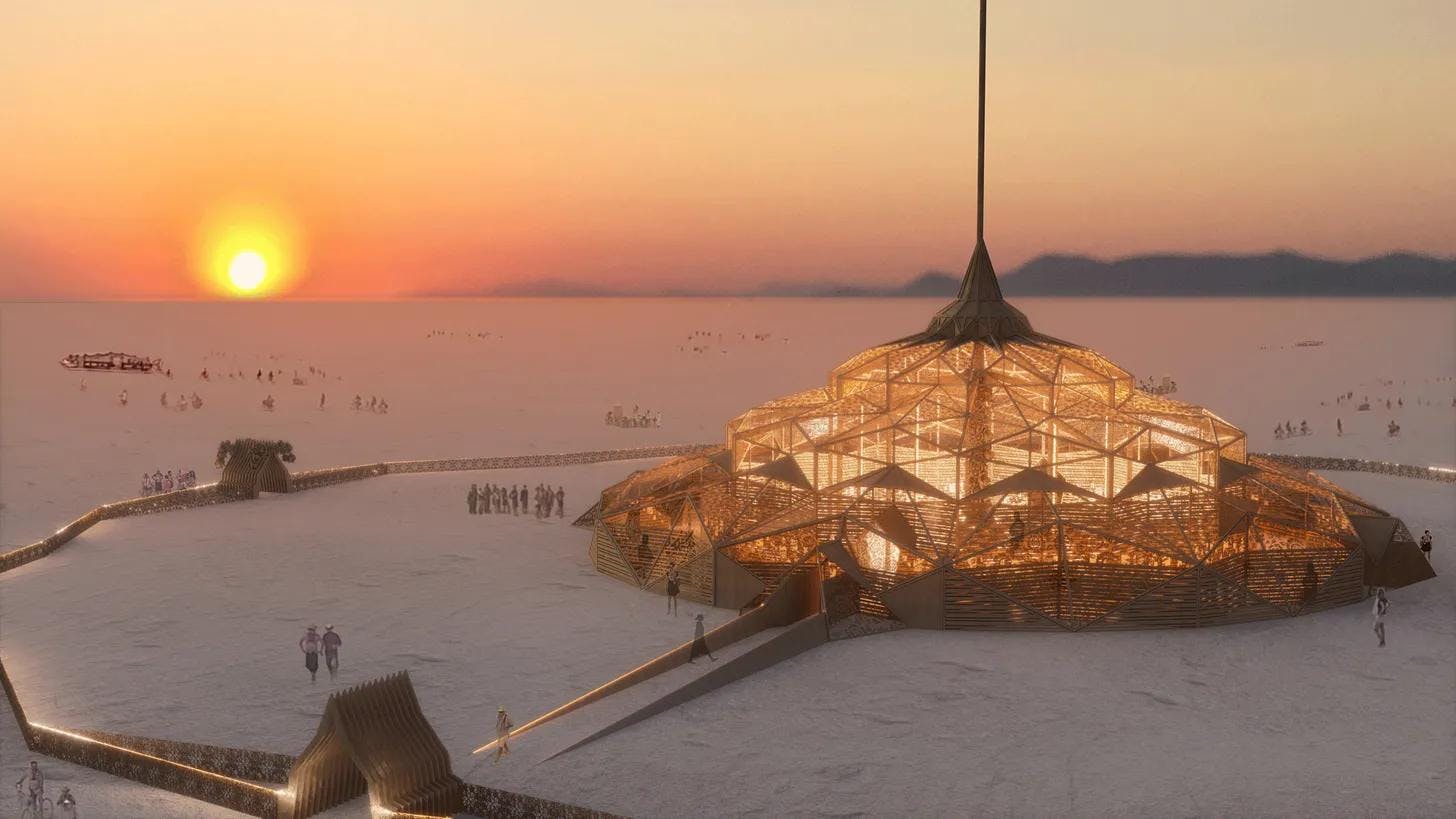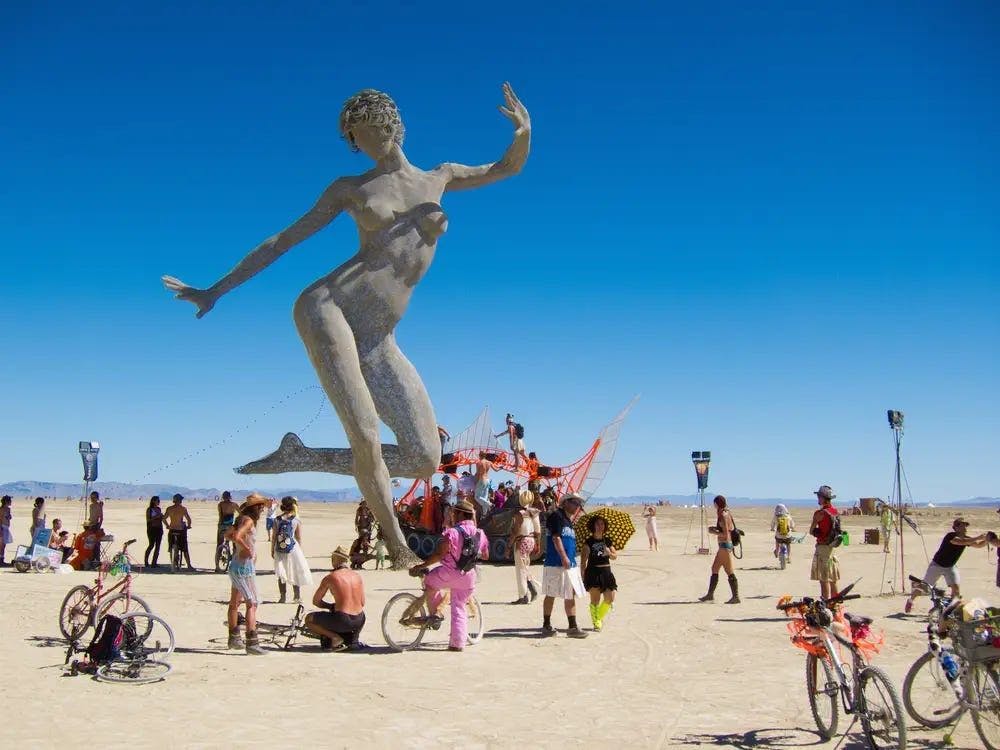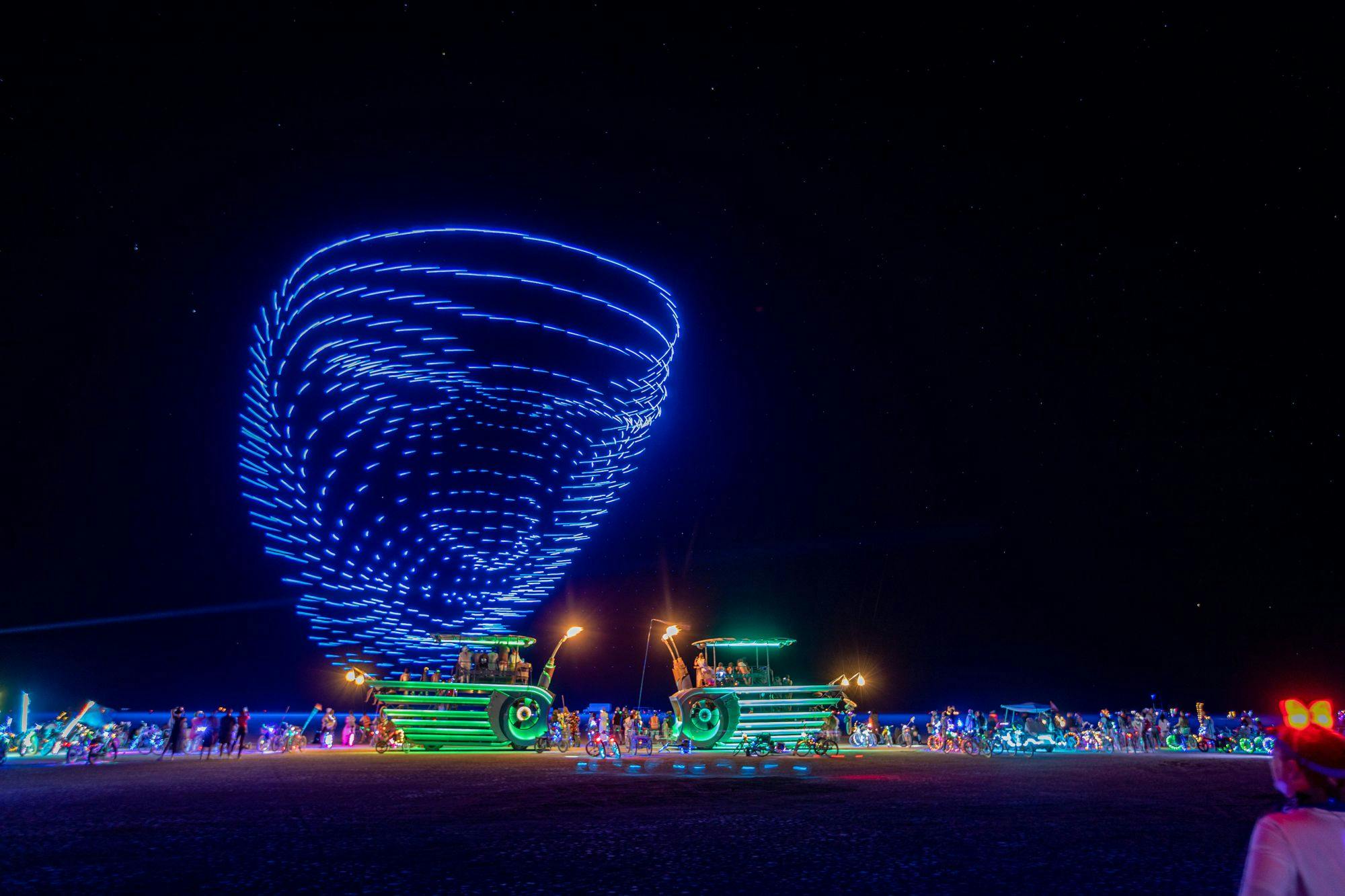Touching Grass is Good For You — LiterallyJan 14
people online are walking around barefoot for their health and selling infrared mats for $700. science suggests “grounding” isn’t as crazy as it sounds
Riley NorkImaginary friends. Monday morning, 48 hours into a global, social media-induced fake news hysteria, thousands of Burning Man attendees began their long, dirty trip home after what now seems, by all available indication, a largely pleasant (if unusually wet) week in the desert. Many, checking into their cursed apps for the first time in a week, were surprised to discover the following: they were apparently in danger of starvation; the 70,000-person event (a notably light year), populated almost entirely by billionaire venture capitalists, had collapsed into a Titanic-level disaster in which only the most elite of elites (Diplo and Chris Rock) were permitted to exit by way of private shuttle (they hiked several miles through the mud to a road, where they hitched a ride to town); and giant, prehistoric fairy shrimp had hatched from acid mud, which was burning holes through the skin of anyone it touched, while a virus, possibly Ebola, reduced the poors (venture capital associates?) to fits of coughing blood. Men in hazmat suits arrived. The area was under quarantine. Some people were possibly eating other people? But more incredible than this incredibly fake account was the popular takeaway: thousands of people were in danger of dying, we were told, and — for an incoherent myriad of diametrically opposed political reasons — this was awesome.
Cool.
The earliest incarnation of what we might today call “Burning Man” took place in 1986, on a beach in San Francisco. There, twenty people partied on the summer solstice, and burned an eight-foot wooden effigy. Almost four decades later, for one week a year, Black Rock rises up into a temporary 80,000-person city in the Nevada desert. Burning Man is referred to as a festival, a “campout,” a kind of pilgrimage. The ethos is “radically inclusive.” Among participants, self-reliance is prized, along with creativity, and a rugged, adventurous spirit. It was from the start a synthesis of technology, art, and many of the values you might today term libertarian, or highly freedom-oriented. But in popular culture the event is generally known for drugs, music, otherworldly giant statues, fantastical outfits, and a kind of pseudo-pagan laid back Xanax hippie approach to “community,” decommodified “giving,” and “oneness” with the world. I first heard about it in my early 20s, and was immediately captivated by the thought of something so massive, assembled from nothing in a week, and gone a week later.
How, in a country where building anything new often felt impossible, could so much be created and destroyed — vanished without a trace, back into the barren sands — in just a couple weeks?
Here’s an aerial shot from the year I finally went, in 2015:

Here, some examples of evocative art typical of the week:

Image: BurningMan.org

Image: TenSafeFrogs

Image: temple2023.com

Image: dronestories.com
This year, it’s true there was a lot of rain, and therefore mud. Conditions were among the hardest in Burning Man history, and there actually was something of a crisis when it came to getting people safely out, which the logistical wizards who run Burning Man handled with incredible skill, and tremendous grace under pressure. Though many attendees don’t typically leave until Monday, and were therefore not impacted by the delay out, many were stuck a day or two more than they originally planned. From these few, actual facts, a story, largely generated on Twitter and TikTok nowhere near the actual desert, naturally evolved in keeping with the law of memes. And listen, let’s just get it out of the way right now: the memes were top tier. I would never take that away from all my shitposters simply in it for the love of the game. But the story’s social propellant, so to speak, was absolute poison.
From the “trad” right, the quickly invented catastrophe was framed as a lot of woke yuppies defiling their bodies before God, finally receiving their biblical punishment. A softer sort of conservative framed the doughy city dwellers as incapable of weathering a little rain. From the socialists, Burning Man was characterized as a city of wealthy drug tourists begging for help after failing to provide assistance to — *feverishly checks notes* — Maui, maybe? From here, various fictional class conflicts were woven into the story, and, when the sun set, the “colonizers” (mostly white people) left the “natives” (mostly white people) to clean up (this didn’t happen). Environmentalists on TikTok broke down the carbon footprint of the event. Bored, former Gen X libertarians noted Burning Man had not been relevant for decades, and here, it was declared, we finally saw the Millennial midlife crisis. In aggregate, reaction was almost totally incoherent. But there was one thing on which all the haters could agree: everyone at Burning Man was rich.
Now, I have personally never felt rich people are necessarily deserving of death simply on account of they are rich. I also think rich people doing crazy, adventurous shit is net valuable for society. In fact, I just took a lot of this apart after the mob threw a national holiday following the submersible implosion. But this was — this is — not that.
Most people at Burning Man are in tents or cardboard yurts, which cost a couple hundred dollars. A ticket is $575 dollars. A vehicle pass is $150. After supplies, food, and water, all of which you’re bringing to camp, gifts for gifting, and a couple Mad Max-looking costume changes, the average burner spends something like $1,500 to $2,000 for a week in Black Rock City, or $200 to $300 a day. That’s more than your average camping trip, but less than your average night out with Taylor Swift, and significantly less than a Disney World vacation. Yes, there are some people in RVs, and yes, I’m sure many people who you personally hate have been to Burning Man. But the average repeat “burner” is just some guy, or some girl, who had this thing on their bucket list, and fell in love with the experience. The invented story of their privilege is only used to justify popular joy when misery befalls them, a tale as old as time. But the crazy thing here? No misery befell them. Hatred for this made-up class of people was so pronounced it birthed an entirely made-up catastrophe.
There were no complaints from Black Rock City. There was not even one, tear-filled viral clip the online crowd could unfairly use for proof of the fantasy. The desert has famously terrible cell service, but the scant videographic evidence we saw all seemed to indicate people were mostly in good spirits, prepared as they all were for harsh conditions. I reached out to a handful of burners for comment.
“Def unprecedented but it’s barely made a dent in most people’s plans given that majority don’t leave til late Sunday or Monday anyway,” said Liv Boeree, “and things are mostly moving again already. Of course the media hates the event because it shows that humans are actually great and capable and kind.”
“It was fun even during the rain,” said Lee Fang. “Just a few moments of panic and anxiety when we all thought the rain wouldn’t stop all weekend. Everyone came together and took care of each other, was chill despite all the mud.”
So where is this reaction coming from?
A few things. First, our culture’s relentless politicization of everything provides the opportunity to graft a popular moral issue atop a fairly common human impulse in the face of strangers having fun. But we used to simply call this “jealousy.” You’re jealous. A bunch of jealous bitches.
Then, Burning Man — just technically speaking, in the production of it all, and the sheer scale of the celebration — is obviously quite impressive, which many people find inspiring. But many others, across political ideologies, recoil from the remarkable. Where the healthy mind is generally capable of perceiving beautiful art as uplifting, the disordered mind turns inward, and shrivels by the self-comparison. What, the average hateful gawker wondered as the burners ascended in towers of light and sound, am I doing this weekend? And the answer was nothing. Is that because nobody invited me, or because I’m not really capable of anything impressive? Difficult thoughts for a man with low confidence.
Maybe the last thing, perhaps the deepest darkest piece of this, is self-projection. Is it really so surprising that the socialist from money has a problem with out-of-touch rich people searching for meaning? How many of the “trads” on Twitter, unnerved by the whole Gomorrah spectacle, even go to church? The GenX guys laughing at the aging Millennials are almost too obvious; if we’re experiencing our midlife crises… where does that leave them? They invented Burning Man.
It’s perfectly fine to ignore stuff you don’t care about, or don’t like. There are any number of reasons Burning Man is probably not for you. It’s probably not for me, honestly, at this stage of my life. But the hatred for it? That has nothing to do with the event, which most of the haters online have never attended. It also has nothing to do with people at the event, who most of the haters have never met. No, this wasn’t about techies or hippies or woke idiots. This wasn’t about socialism, or God. For the average hater, this was war with the demonic apparitions of their own self-doubt, and all their insecurities, on a public stage before an audience of millions. The “cringe social media influencers” were not at Burning Man, in other words. They were glued to their newsfeeds, inside, on a nice day. A little bit pathetic, if we’re being honest.
Now try to be less embarrassing, or at least have the decency to shut up and let people like shit.
-SOLANA
0 free articles left